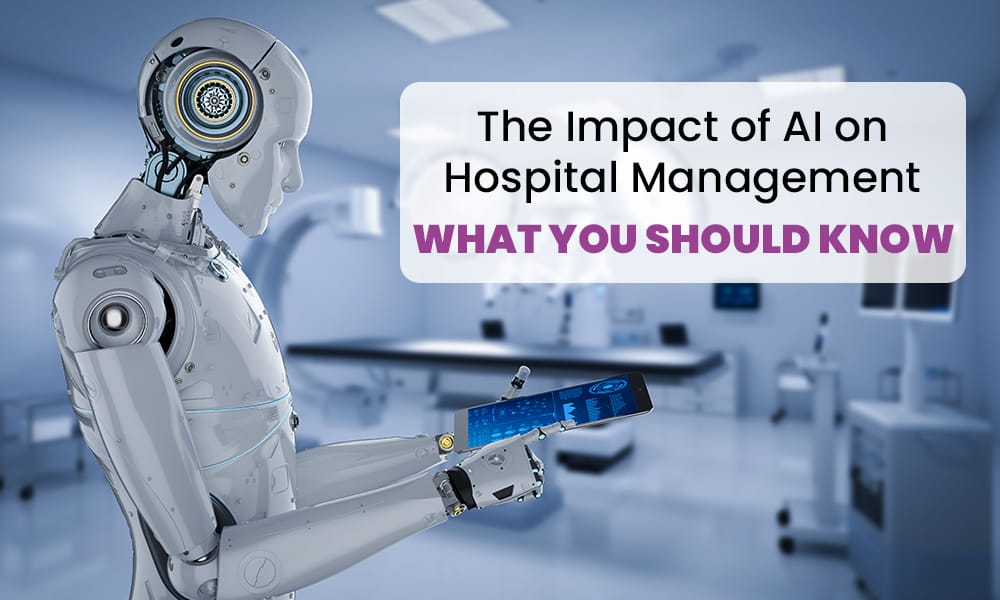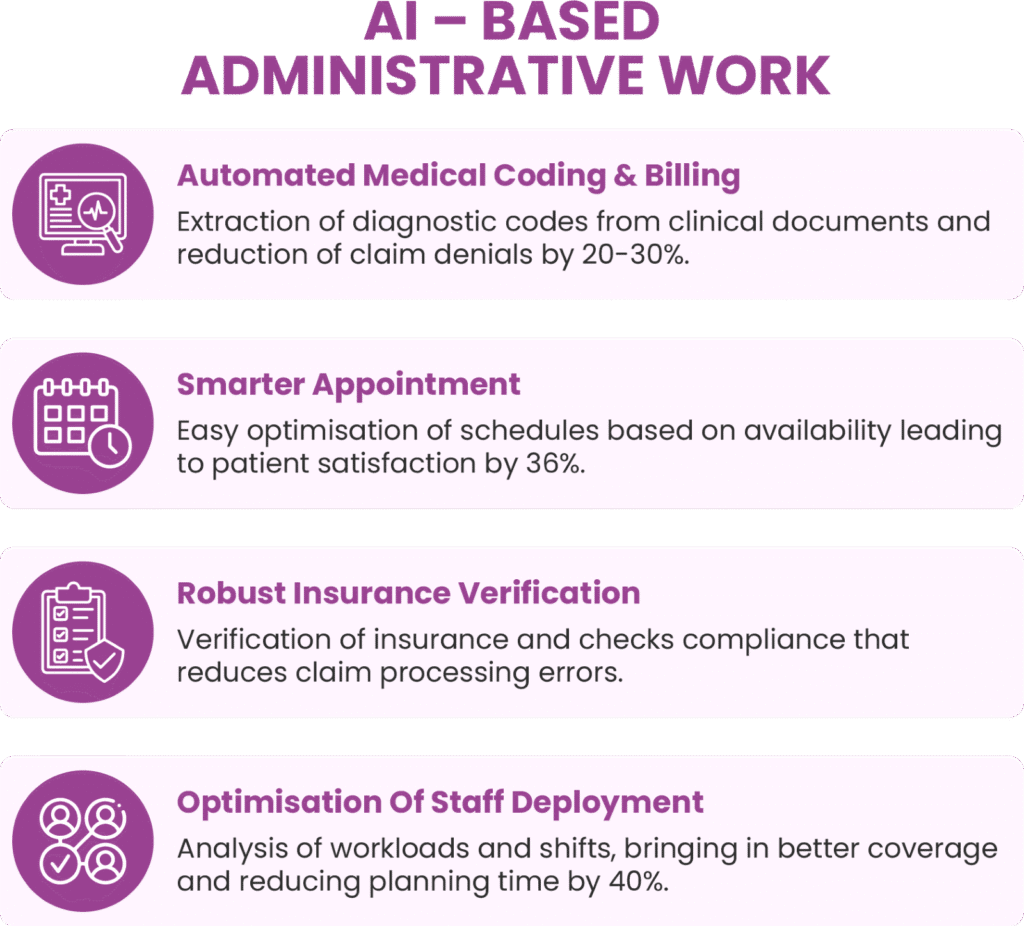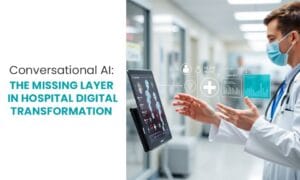
Nowadays, hospitals are navigating an increasingly complex landscape—rising operational costs, persistent staffing shortages, heightened patient expectations, and the explosion of healthcare data. In this high-pressure environment, artificial intelligence (AI) has emerged as a game-changing force in hospital management. From streamlining workflows and optimising resource utilisation to enhancing diagnostic accuracy and accelerating revenue cycles, AI in healthcare is no longer optional—it’s essential.
This blog explores how forward-thinking hospitals are leveraging AI-powered systems to drive smarter decisions, deliver superior patient outcomes, and build more resilient, efficient healthcare operations.
AI-Powered Transformation in Hospital Operations
AI hospital software streamlines operations across departments, replacing manual, time-consuming tasks with intelligent automation. From smart scheduling to AI-driven inventory management, hospitals can minimise administrative friction while maximising care quality. For example, predictive analytics embedded in AI-enabled hospital management systems in 2025 allow healthcare providers to proactively detect equipment wear and forecast patient admission surges based on historical patterns and environmental triggers.
According to a 2024 study published in the Journal of Healthcare Information Management, hospitals that deployed predictive AI for demand forecasting reduced ER overcrowding by 28% during peak flu season. Similarly, a Harvard Medical School report highlighted that hospitals using intelligent supply chain systems cut procurement errors by 45%.
Moreover, AI automation significantly improves the shift fulfilment process. With traditional scheduling, human resource departments spend hours manually balancing shifts. Modern AI tools match staff availability, skill sets, and compliance factors within minutes, improving workforce efficiency. Facilities using AI in hospital management report a 30–40% faster turnaround in administrative workflows, empowering clinical staff to focus on patient-centric duties instead of paperwork.
Before and After AI in Hospital Operations
| S.No. | Operational Area | Before AI Implementation | After AI Implementation |
| 1 | Patient Diagnosis | Manual diagnosis with delayed results | Real-time diagnostics with predictive analytics |
| 2 | Staff Scheduling | Spreadsheets and manual coordination | Automated and optimized scheduling |
| 3 | Inventory Management | Inventory stockouts and overstock | Predictive restocking and real-time tracking |
| 4 | Clinical Documentation | Time-consuming paperwork | Automated documentation with NLP tools |
| 5 | Patient Engagement | One-size-fits-all communication | Personalized and timely interaction |
The “Before and After AI in Hospital Operations” table highlights the significant impact AI brings to core hospital functions. Traditionally, processes like diagnosis, staff scheduling, inventory control, and documentation were manual, time-consuming, and prone to errors. With AI integration, hospitals now benefit from predictive analytics, automation, and real-time insights that improve efficiency and patient care. AI-enabled tools streamline operations, minimise human error, and enhance staff productivity. This shift empowers healthcare decision-makers to deliver higher quality services while optimising resources. The transformation showcased in the table supports strategic planning and investments into AI-driven hospital management systems.
Diagnostic Precision and Clinical Support
Modern hospitals must operate with both speed and accuracy—especially in diagnosis. Integrating artificial intelligence in healthcare systems transforms diagnostic workflows, making them more precise, consistent, and efficient.
• AI-Powered Clinical Decision Support Systems (CDSS)
AI-driven Clinical Decision Support Systems (CDSS) help physicians make faster, evidence-based decisions. These systems process vast amounts of patient data—such as symptoms, lab results, imaging scans, and historical records—to suggest probable diagnoses and treatment pathways. Unlike manual reviews, AI hospital software can analyse millions of data points in seconds, highlighting patterns that might be missed during a routine clinical assessment.
For example, AI tools trained on thousands of imaging scans can detect abnormalities in MRIs or X-rays with higher sensitivity than human interpretation alone. This reduces diagnostic errors and shortens the time between evaluation and treatment, which is especially critical in emergency and oncology departments.
• Reduction in Misdiagnosis and Human Error
Hospitals applying AI in hospital management report up to a 25% increase in diagnostic accuracy. By minimising misdiagnoses and false negatives, AI ensures that patients receive timely and appropriate care. Clinical support platforms also standardise diagnostic protocols, reducing variability across departments and enhancing consistency in care delivery.
• Enhanced Collaboration and Specialist Support
AI also serves as a bridge between general practitioners and specialists. In facilities with limited access to speciality care, AI-based tools can provide interim guidance, helping clinicians make informed referrals or initial treatment decisions. This is particularly valuable in rural or underserved hospital settings.
• Real-World Example
In one multi-centre study, hospitals using AI-driven radiology assistants reduced CT interpretation time by 40%, leading to quicker decisions in trauma and stroke cases. These kinds of outcomes highlight how AI in healthcare is not just a support tool—it’s becoming a clinical asset.

Enhancing Administrative Workflows with AI
In today’s fast-paced hospital environment, inefficient administrative processes often result in delayed patient care, staff burnout, and revenue leakage. AI-powered hospital systems transform traditional workflows by automating routine and complex administrative tasks—freeing up valuable human resources to focus on high-impact areas.
• Automated Medical Coding and Billing
Medical coding is time-consuming and prone to human error, which can lead to claim denials and revenue loss. AI-driven hospital management systems use natural language processing (NLP) and machine learning to automatically extract diagnostic codes from physician notes, lab results, and discharge summaries. These tools ensure greater accuracy and consistency, improving reimbursement rates and reducing coding backlogs. AI medical coding tools reduce average claim denial rates by 20–30% across major hospitals.
• Smarter Appointment Scheduling
AI algorithms analyse historical appointment data, doctor availability, patient preferences, and resource utilisation to generate optimised schedules. This minimises scheduling conflicts, reduces patient wait times, and ensures better clinical resource allocation. Hospitals using AI for scheduling report a 35% improvement in patient throughput.
• Streamlined Insurance Verification and Claims Management
Insurance verification delays are a major bottleneck in hospital administration. AI hospital software verifies insurance eligibility in real-time, flags policy issues, and checks for pre-authorisation requirements—significantly speeding up the intake process. AI systems also cross-verify claims against payer rules, minimising errors and maximising claim approval rates.
• Optimising Staff Deployment
AI-enabled hospital management systems analyse staff availability, workloads, and shift patterns to automatically create balanced rosters. This improves coverage, minimises overtime costs, and enhances job satisfaction. Hospitals that implement AI in workforce scheduling see up to a 40% reduction in administrative planning time.
• Improving Patient Throughput and Resource Utilisation
AI helps administrators predict patient flow, bed occupancy rates, and discharge timelines. These insights guide proactive decision-making, ensuring that resources like ICU beds, diagnostic equipment, and operating rooms are used efficiently. Hospitals using AI for operational planning report a 25% increase in patient throughput and a 15% reduction in idle resources.
How AI Enhances Hospital Administration and Workflow
Currently, hospitals are increasingly turning to artificial intelligence (AI) to streamline administrative processes, optimise staffing, and improve overall workflow efficiency. By leveraging AI-powered systems, healthcare institutions can address longstanding challenges such as staffing shortages, scheduling inefficiencies, and administrative burdens.
• Predictive Staffing and Shift Optimisation
AI-driven scheduling tools analyse historical data, patient admission trends, and staff availability to forecast staffing needs accurately. This predictive approach ensures that departments are neither understaffed nor overstaffed, leading to improved operational efficiency. A community hospital network implemented AI-based staff scheduling and reported a 15% reduction in overtime costs while simultaneously improving staff satisfaction scores by 22%.
• Recruitment Forecasting and Human Resources Management
AI bots assist human resources departments by analysing workforce trends, predicting recruitment needs, and identifying potential gaps in staffing. This proactive approach enables hospitals to plan and execute recruitment strategies effectively. A study highlighted that AI-based personnel scheduling offers time savings, increased accuracy, flexibility, and enhanced compliance, contributing to more efficient workforce management.
• Enhanced Scheduling Accuracy
AI-powered hospital systems utilise machine learning algorithms to suggest optimal shift allocations based on various factors, including staff preferences, qualifications, and historical data. This data-driven approach enhances scheduling accuracy and staff satisfaction. Banner Health achieved a 35% labour productivity gain and improved scheduling accuracy by 10% after deploying an AI-powered healthcare solution.
• Workflow Automation and Administrative Efficiency
AI automates routine administrative tasks such as appointment scheduling, insurance verification, and medical coding. This automation reduces operational delays, minimises errors, and allows administrative staff to focus on more critical tasks. According to a Forbes article, successful implementation of AI into healthcare administration requires comprehensive staff training to ensure administrators can effectively incorporate AI tools into their workflow .
The Future Is AI-Driven
AI is revolutionising hospital management, making it essential rather than optional for future-ready institutions. By integrating AI-powered hospital systems, healthcare providers enhance decision-making, reduce costs, and boost efficiency. These technologies support precision care by complementing human expertise, automating workflows, and improving resource allocation.
As we move into 2025, hospitals adopting AI hospital software will gain a competitive edge through smarter operations and improved patient outcomes. Embracing AI today ensures a more adaptive, intelligent, and sustainable healthcare environment for tomorrow.





